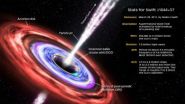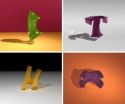(Press-News.org) There's a passage in the Old Testament's Deuteronomy that says if a case too difficult to decide comes before the courts, it should be brought to the Levite priests who will render a verdict in God's name. However, one University of Alberta researcher says that may be taking religious freedom a step too far.
Sarah Hamill, a doctoral student in the Faculty of Law, recently published an article in response to a premise that said judges who lack direction-setting precedence in cases should use religious-based reasoning. Hamill contends that—aside from being a serious breach of the separation of church and state—such decisions would be constitutionally dangerous. She says that when it comes to deciding on issues from human rights to balancing conflicting rights, cooler, secular heads should prevail.
"In order for everybody to be able to agree with a judicial decision, they have to start from a position of neutrality, which is the state," said Hamill.
In praise of a secular state
Hamill notes that the emergence of Western democratic states gave rise to a separation of church and state, one that saw religions lose their place in national identity and their influence on political power. In Canada, immigration and the adoption of a multicultural society has led to what she calls a new understanding of a secular society. She says the Canadian Charter of Rights and Freedoms guarantees freedom of religion and conscience for all, and aims to promote tolerance and accommodation of Canadians' wide variety of religious beliefs. But she says that when it comes to equality and fairness in law, religious considerations have no place in the judicial decision-making process.
"I understand the emergence of secularism as a compromise," said Hamill, "but it's a compromise that is needed if we're going to come together and live together. Particularly if we're going to live together peacefully."
When church and state collide
Even within a secular society, there will be clashes. Hamill cites examples of legal challenges in which religious beliefs and personal freedoms collided, such as the case of a drugstore chain that questioned the legality of a law that forbade Sunday shopping, or a printer who refused to accept a print job for a gay and lesbian organization because of his religious beliefs. For cases in which there is potential for conflict, Hamill says there is usually sufficient Supreme Court jurisprudence and case law that clearly identify where the interests of the law rest.
"Freedom of religion means accommodation but not support. The Canadian state is not trying to impose any one set of particular religious views on anybody," said Hamill. "These are democratically agreed-upon views, a commitment to live together peacefully. People don't have to agree with it, but they have to comply with it."
Judges as Solomon lite: All the wisdom, without the faith
Hamill says judges need to remain unbiased and impartial in any case they preside over, and should recuse themselves from a case when they believe themselves incapable of remaining neutral, to remove any chance of impartiality or bias. Impartial legal decision-making actually favours all parties; otherwise legal findings could alter significantly depending on the religious bent of the judge. Whichever side of the court Canadians find themselves on, she says, the absence of religious-based reasoning ensures fairness and equality.
"An impartial judiciary is crucial for ensuring fairness and justice in the application of the law," said Hamill. "Judicial decisions free of religious-based reasoning ensure that the state does not support one religion over another, or impose religious beliefs on those who may not share them. Thus it actually upholds, rather than infringes, freedom of religion."
INFORMATION: END
KINGSTON, R.I. – August 2, 2012 – A postdoctoral researcher at the University of Rhode Island has observed a never-before-seen defensive strategy used by a small species of deep-sea squid in which the animal counter-attacks a predator and then leaves the tips of its arms attached to the predator as a distraction.
Stephanie Bush said that when the foot-long octopus squid (Octopoteuthis deletron) found deep in the northeast Pacific Ocean "jettisons its arms" in self-defense, the bioluminescent tips continue to twitch and glow, creating a diversion that enables the squid ...
In science fiction novels, evil overlords and hostile aliens often threaten to vaporize the Earth. At the beginning of The Hitchhikers Guide to the Galaxy, the officiously bureaucratic aliens called Vogons, authors of the third-worst poetry in the universe, actually follow through on the threat, destroying the Earth to make way for a hyperspatial express route.
"We scientists are not content just to talk about vaporizing the Earth," says Bruce Fegley, professor of earth and planetary sciences at Washington University in St. Louis, tongue firmly in cheek. "We want to understand ...
Last year, astronomers discovered a quiescent black hole in a distant galaxy that erupted after shredding and consuming a passing star. Now researchers have identified a distinctive X-ray signal observed in the days following the outburst that comes from matter on the verge of falling into the black hole.
This tell-tale signal, called a quasi-periodic oscillation or QPO, is a characteristic feature of the accretion disks that often surround the most compact objects in the universe -- white dwarf stars, neutron stars and black holes. QPOs have been seen in many stellar-mass ...
Durham, NC – What makes some species more prone to extinction? A new study of nearly 300 species of New Zealand birds — from pre-human times to the present — reveals that the keys to survival today differ from those of the past.
The results are important in light of the growing number of studies that try to predict which species could be lost in the future based on what kinds of species are considered most threatened today, said lead author Lindell Bromham of Australian National University.
In the roughly 700 years since humans arrived in the remote islands that make ...
Jeanne Romero-Severson, associate professor of biological sciences at the University of Notre Dame, and her collaborators, are tracking the evolution of the live oaks of eastern North America, seeking to understand how the trees adapted to climate change during glacial periods.
When the ice advanced, the oaks retreated. When the ice retreated the oaks advanced, spreading from tropical to temperate zones, up from Central America and Mexico into the Piedmont Carolinas. The researchers expect the study of live oak migrations and phylogeny will provide clues to the success ...
Computer-generated characters have become so lifelike in appearance and movement that the line separating reality is almost imperceptible at times. "The Matrix" sequels messed with audiences' perceptions of reality (in more ways than one) with action scenes mixing CG characters and real actors. Almost a decade later, superheroes and alien warriors dominate the multiplex. But while bipeds and quadrupeds have reigned supreme in CG animation, attempts to create and control their skeleton-free cousins using similar techniques has proved time-consuming and laborious.
Georgia ...
On the classic TV show "I Love Lucy," Ricky Ricardo was known for switching into rapid-fire Spanish whenever he was upset, despite the fact Lucy had no idea what her Cuban husband was saying. These scenes were comedy gold, but they also provided a relatable portrayal of the linguistic phenomenon of code-switching.
This kind of code-switching, or switching back and forth between different languages, happens all the time in multilingual environments, and often in emotional situations. In a new article in the July issue of Perspectives on Psychological Science, a journal ...
CHAPEL HILL, N.C. -- Treating chronic venous leg ulcers with a topical spray containing a unique living human cell formula provides a 52 percent greater likelihood of wound closure than treatment with compression bandages only.
That's the conclusion of a new study conducted in part at the University of North Carolina School of Medicine and published online by The Lancet this week.
The Phase II clinical trial, which investigates the efficacy of HP802-247 from Healthpoint® Biotherapeutics, was designed to determine effectiveness of certain cell concentrations and dosing ...
Our planet's changing climate is devastating communities in Africa through droughts, floods and myriad other disasters.
Using detailed regional climate models and geographic information systems, researchers with the Climate Change and African Political Stability (CCAPS) program developed an online mapping tool that analyzes how climate and other forces interact to threaten the security of African communities.
The program was piloted by the Robert S. Strauss Center for International Security and Law at The University of Texas at Austin in 2009 after receiving a $7.6 ...
VIDEO:
Gary Crameri, part of CSIRO’s bat virus team, discusses Cedar virus.
Click here for more information.
Australian scientists have discovered a new virus in bats that could help shed light on how Hendra and Nipah viruses cause disease and death in animals and humans.
The new virus - named 'Cedar' after the Queensland location where it was discovered - is a close relative of the deadly Hendra and Nipah viruses.
However, CSIRO's initial studies have discovered ...




